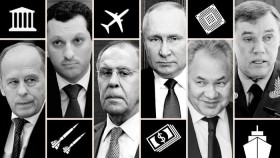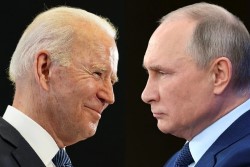President Vladimir Putin's war on Ukraine has prompted the United States to impose harsh economic penalties on Russia aimed at weakening Russia's economy, access to technology and financial institutions.
"Putin chose this war," Joe Biden said at the White House on Thursday. Now he and his country will face the consequences. "
Russian stocks fell to their lowest level in more than four-and-a-half years on Thursday, while the ruble hit a record low against the dollar.
More is now being done to squeeze the Russian economy and limit growth, while increasing credit prices, inflation and capital outflows.
The Biden administration issued a statement Thursday afternoon announcing penalties and export controls on top Russian financial institutions that would more than halve Russian high-tech imports.
Russia's largest bank was cut off from the U.S. financial system, Russia's second-largest bank was sanctioned, and all its assets in contact with the U.S. financial system were frozen.

The White House said the sanctions on major Russian financial institutions included "total freezes, sanctions on agent and transfer accounts, and debt and equity restrictions."
If Putin does not change course, we will continue to punish him severely," the Biden administration said in an official statement.
The United States praised Australia, the European Union, Canada, Japan and the United Kingdom for agreeing to take "fairly forceful" action against Russia in response to Russian aggression.
Here are the U.S. sanctions:

1. Restricting Russia's largest bank Sberbank and its 25 subsidiaries from the U.S. financial system and its ability to trade in dollars. Sberbank accounts for about a third of Russian banking assets.
2. Sanction VTB Bank (VTB), Russia’s second largest financial institution, and its subsidiaries, freeze assets related to the U.S. financial system, and prohibit U.S. citizens from doing business with it. VTB controls nearly one-fifth of Russia's banking assets.
3. Hundreds of subsidiaries of Bank Otkritie, Sovcombank OJSC and Novikombank, as well as some other Russian financial institutions, are affected by asset freezes and business bans in the United States.
4. There are no restrictions on new debt or equity for 13 major Russian financial companies, of which 13 Russian state-owned enterprises have not issued new debt or equity. The list includes Sberbank, Credit Bank of Moscow, AlfaBank, Gazprombank, Gazprom, Agricultural Bank of Russia, Gazprom Neft, Rostelecom, Transneft, RusHydro, Sovcomflot, Alrosa and Russian Railways. These companies have $1.4 trillion in assets and are unable to raise capital in the U.S. market.
5. Sanctions on Russian officials, their families, and others who "get rich at the expense of the Russian state" will be fully implemented. In addition, the heads of major Russian financial institutions and those responsible for financing the invasion of Ukraine were also targeted.
6. Two other dozen Belarusians were fined for their roles in the attack on Ukraine. Among other things, the sanctions affect nine arms companies and seven individuals.
7. It is illegal for the Russian Ministry of Defense to purchase U.S.-made products or use U.S. software, equipment, or technology.
8. Russia-wide restrictions on defense, aviation and maritime technology are aimed at cutting off Moscow's supply of high-tech products. This includes a nationwide export ban on some Russian technology. Due to U.S. sanctions, some U.S.-made technologies in other countries, such as semiconductors and cryptographic security, as well as lasers and sensors, will be restricted in Russia.
9. The U.S. will no longer require a license for goods produced in these countries for countries that have banned Russian exports. The European Union and other countries including Japan, Canada, Australia and the United Kingdom have already announced similar actions.